BMA735 Management Ethics Case Study: Ethical Dilemmas and Solutions
VerifiedAdded on 2022/10/19
|14
|3770
|12
Case Study
AI Summary
This assignment delves into management ethics through the analysis of three case studies: Retail Food Group (RFG), IOOF Holdings, and Bupa Seaforth. The analysis identifies key ethical issues within each case, such as franchise agreement breaches, financial misconduct, and failures in aged care. The student explores issues like the exploitation of franchisees and workers, misrepresentation of financial information, and neglect of elderly residents. The assignment then justifies and recommends strategies to address these ethical problems, drawing on ethical theories and principles to propose actionable solutions. Recommendations include upholding good faith and fairness in franchise agreements, ensuring accurate financial reporting, prioritizing client interests, and improving the quality of care in aged care facilities. The assignment emphasizes the importance of ethical conduct in management and the consequences of unethical practices, providing a comprehensive examination of the issues and potential remedies.
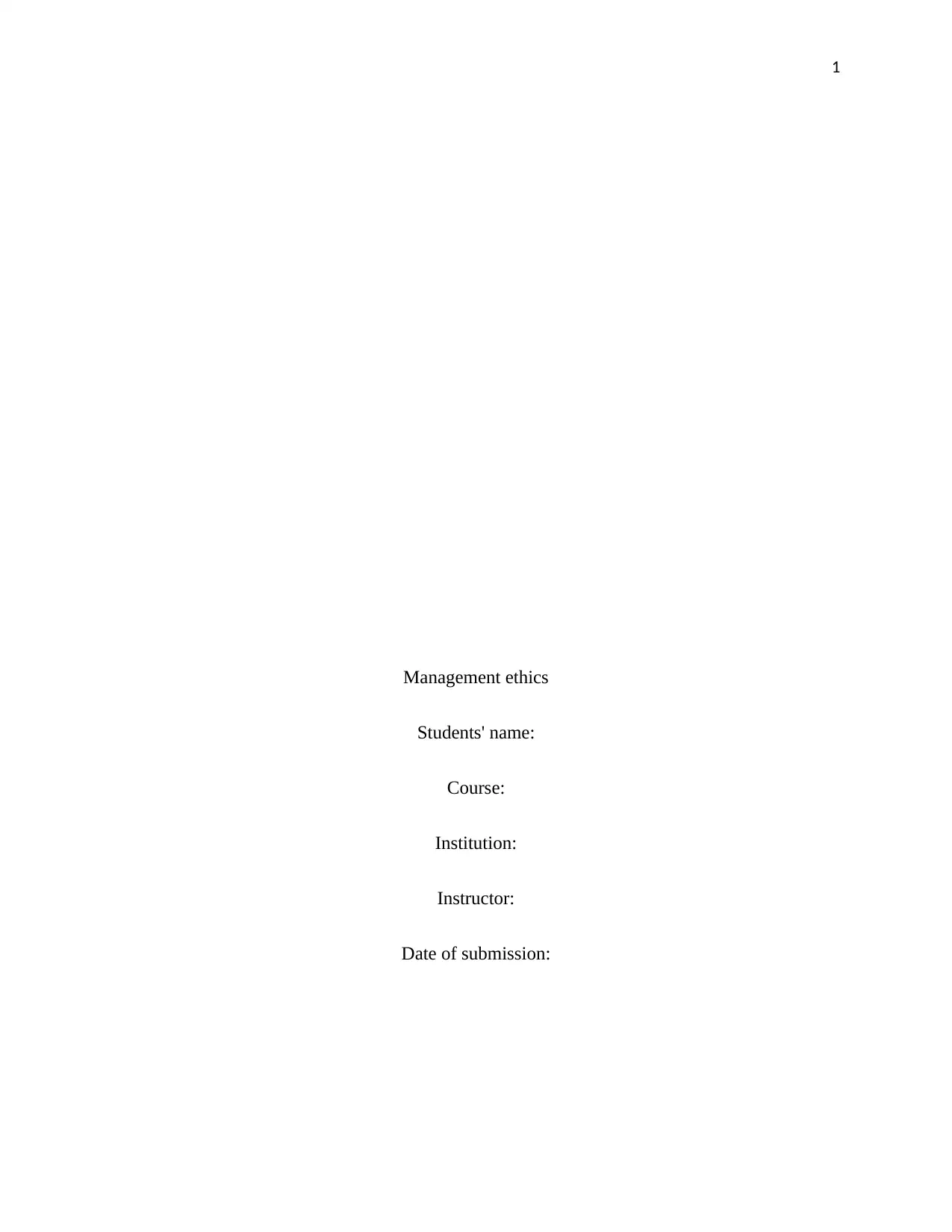
1
Management ethics
Students' name:
Course:
Institution:
Instructor:
Date of submission:
Management ethics
Students' name:
Course:
Institution:
Instructor:
Date of submission:
Paraphrase This Document
Need a fresh take? Get an instant paraphrase of this document with our AI Paraphraser
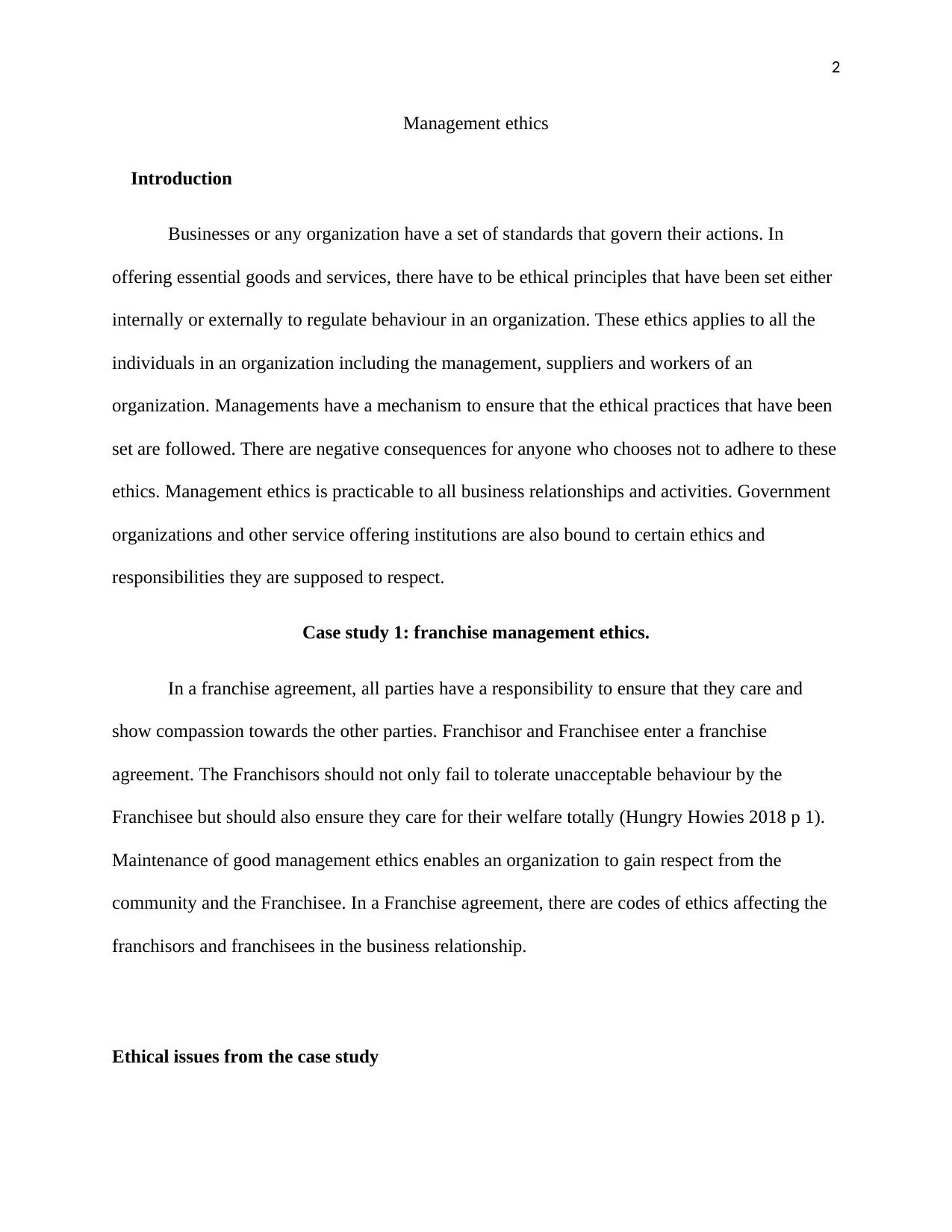
2
Management ethics
Introduction
Businesses or any organization have a set of standards that govern their actions. In
offering essential goods and services, there have to be ethical principles that have been set either
internally or externally to regulate behaviour in an organization. These ethics applies to all the
individuals in an organization including the management, suppliers and workers of an
organization. Managements have a mechanism to ensure that the ethical practices that have been
set are followed. There are negative consequences for anyone who chooses not to adhere to these
ethics. Management ethics is practicable to all business relationships and activities. Government
organizations and other service offering institutions are also bound to certain ethics and
responsibilities they are supposed to respect.
Case study 1: franchise management ethics.
In a franchise agreement, all parties have a responsibility to ensure that they care and
show compassion towards the other parties. Franchisor and Franchisee enter a franchise
agreement. The Franchisors should not only fail to tolerate unacceptable behaviour by the
Franchisee but should also ensure they care for their welfare totally (Hungry Howies 2018 p 1).
Maintenance of good management ethics enables an organization to gain respect from the
community and the Franchisee. In a Franchise agreement, there are codes of ethics affecting the
franchisors and franchisees in the business relationship.
Ethical issues from the case study
Management ethics
Introduction
Businesses or any organization have a set of standards that govern their actions. In
offering essential goods and services, there have to be ethical principles that have been set either
internally or externally to regulate behaviour in an organization. These ethics applies to all the
individuals in an organization including the management, suppliers and workers of an
organization. Managements have a mechanism to ensure that the ethical practices that have been
set are followed. There are negative consequences for anyone who chooses not to adhere to these
ethics. Management ethics is practicable to all business relationships and activities. Government
organizations and other service offering institutions are also bound to certain ethics and
responsibilities they are supposed to respect.
Case study 1: franchise management ethics.
In a franchise agreement, all parties have a responsibility to ensure that they care and
show compassion towards the other parties. Franchisor and Franchisee enter a franchise
agreement. The Franchisors should not only fail to tolerate unacceptable behaviour by the
Franchisee but should also ensure they care for their welfare totally (Hungry Howies 2018 p 1).
Maintenance of good management ethics enables an organization to gain respect from the
community and the Franchisee. In a Franchise agreement, there are codes of ethics affecting the
franchisors and franchisees in the business relationship.
Ethical issues from the case study

3
From the case study the following ethical issues emerge:
• Failure to adhere to the terms and conditions by the Franchisor, the Retail food group.
• Franchisee not giving honesty and truthful information about the operations.
• The exploitation of workers by Franchisee in a bid to increase their profit margin.
• Retail food group not offering necessary support to the franchisees.
• Breach of contract by the retail food group
• Retail food group not including the Franchisee in their decision making.
• Franchisee attempting to hide information to avoid paying the service fee.
Justifications and Recommendations to the case study ethical issues
Principle of good faith and fairness applies in cases where a franchise deal has been
made. The business that has entered an agreement with the Franchisee has an ethical
responsibility to provide any information to the prospective Franchisee that would affect the
buying of a franchise (Adler 2018 p2). It is the responsibility of the franchisor to adhere to the
terms and conditions agreed in the first contract unless there is a new interpretation by the court,
which will bring a new deal. In the case of the retail food regroup, the food group did not act in
good faith with some of the franchisee as it concentrated on appeasing the shareholders at the
expense of the store holders.
The codes of ethics guiding the franchise agreement has specific emphasizes on the
values of sincerity, honesty and truth in sharing all the information that is there or that may come
in the middle of a contract. The ethics also emphasizes values of respect and effective
communication with openness and transparency. In case of any disagreement which may arise
from the franchise relationship, both parties should be committed to an amicable resolution of
From the case study the following ethical issues emerge:
• Failure to adhere to the terms and conditions by the Franchisor, the Retail food group.
• Franchisee not giving honesty and truthful information about the operations.
• The exploitation of workers by Franchisee in a bid to increase their profit margin.
• Retail food group not offering necessary support to the franchisees.
• Breach of contract by the retail food group
• Retail food group not including the Franchisee in their decision making.
• Franchisee attempting to hide information to avoid paying the service fee.
Justifications and Recommendations to the case study ethical issues
Principle of good faith and fairness applies in cases where a franchise deal has been
made. The business that has entered an agreement with the Franchisee has an ethical
responsibility to provide any information to the prospective Franchisee that would affect the
buying of a franchise (Adler 2018 p2). It is the responsibility of the franchisor to adhere to the
terms and conditions agreed in the first contract unless there is a new interpretation by the court,
which will bring a new deal. In the case of the retail food regroup, the food group did not act in
good faith with some of the franchisee as it concentrated on appeasing the shareholders at the
expense of the store holders.
The codes of ethics guiding the franchise agreement has specific emphasizes on the
values of sincerity, honesty and truth in sharing all the information that is there or that may come
in the middle of a contract. The ethics also emphasizes values of respect and effective
communication with openness and transparency. In case of any disagreement which may arise
from the franchise relationship, both parties should be committed to an amicable resolution of
⊘ This is a preview!⊘
Do you want full access?
Subscribe today to unlock all pages.

Trusted by 1+ million students worldwide
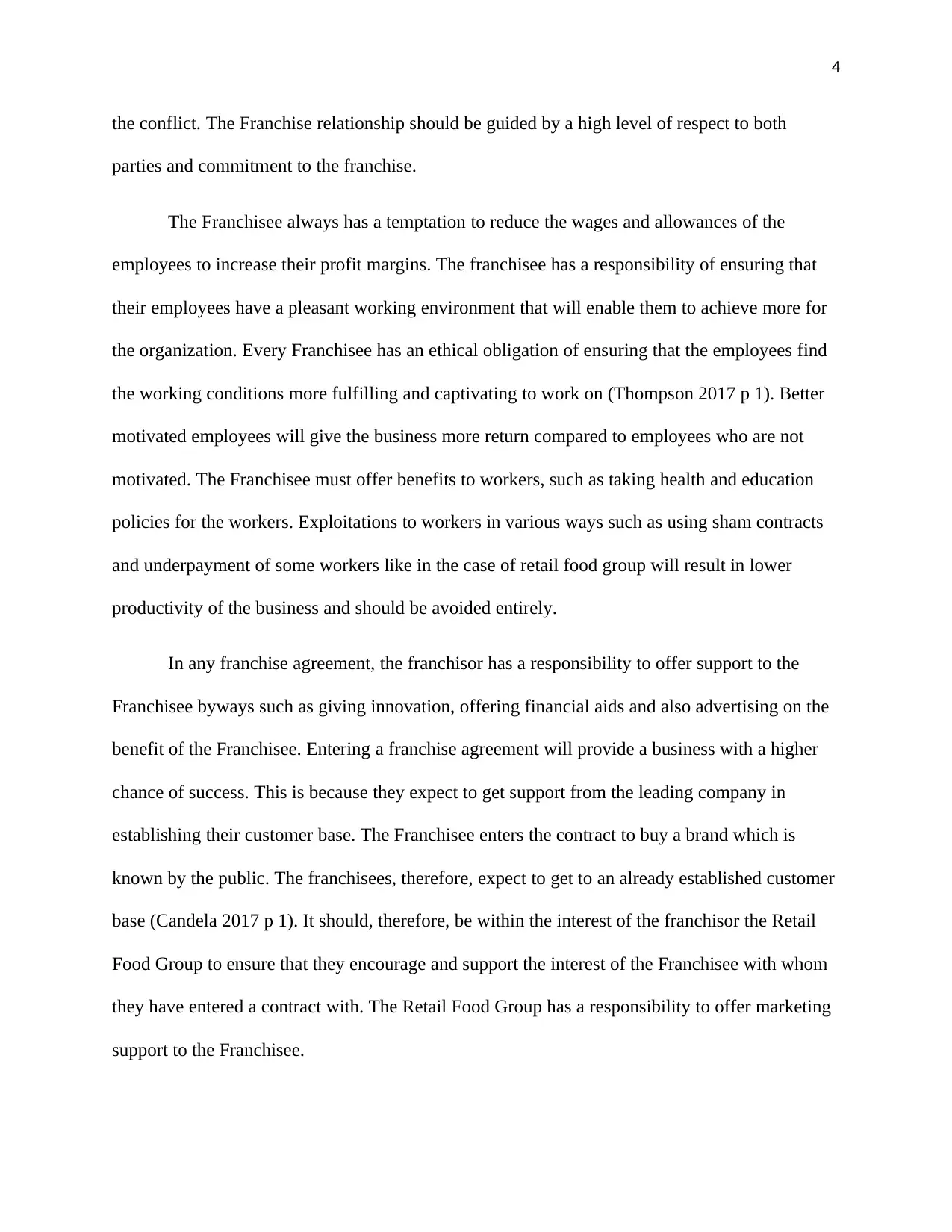
4
the conflict. The Franchise relationship should be guided by a high level of respect to both
parties and commitment to the franchise.
The Franchisee always has a temptation to reduce the wages and allowances of the
employees to increase their profit margins. The franchisee has a responsibility of ensuring that
their employees have a pleasant working environment that will enable them to achieve more for
the organization. Every Franchisee has an ethical obligation of ensuring that the employees find
the working conditions more fulfilling and captivating to work on (Thompson 2017 p 1). Better
motivated employees will give the business more return compared to employees who are not
motivated. The Franchisee must offer benefits to workers, such as taking health and education
policies for the workers. Exploitations to workers in various ways such as using sham contracts
and underpayment of some workers like in the case of retail food group will result in lower
productivity of the business and should be avoided entirely.
In any franchise agreement, the franchisor has a responsibility to offer support to the
Franchisee byways such as giving innovation, offering financial aids and also advertising on the
benefit of the Franchisee. Entering a franchise agreement will provide a business with a higher
chance of success. This is because they expect to get support from the leading company in
establishing their customer base. The Franchisee enters the contract to buy a brand which is
known by the public. The franchisees, therefore, expect to get to an already established customer
base (Candela 2017 p 1). It should, therefore, be within the interest of the franchisor the Retail
Food Group to ensure that they encourage and support the interest of the Franchisee with whom
they have entered a contract with. The Retail Food Group has a responsibility to offer marketing
support to the Franchisee.
the conflict. The Franchise relationship should be guided by a high level of respect to both
parties and commitment to the franchise.
The Franchisee always has a temptation to reduce the wages and allowances of the
employees to increase their profit margins. The franchisee has a responsibility of ensuring that
their employees have a pleasant working environment that will enable them to achieve more for
the organization. Every Franchisee has an ethical obligation of ensuring that the employees find
the working conditions more fulfilling and captivating to work on (Thompson 2017 p 1). Better
motivated employees will give the business more return compared to employees who are not
motivated. The Franchisee must offer benefits to workers, such as taking health and education
policies for the workers. Exploitations to workers in various ways such as using sham contracts
and underpayment of some workers like in the case of retail food group will result in lower
productivity of the business and should be avoided entirely.
In any franchise agreement, the franchisor has a responsibility to offer support to the
Franchisee byways such as giving innovation, offering financial aids and also advertising on the
benefit of the Franchisee. Entering a franchise agreement will provide a business with a higher
chance of success. This is because they expect to get support from the leading company in
establishing their customer base. The Franchisee enters the contract to buy a brand which is
known by the public. The franchisees, therefore, expect to get to an already established customer
base (Candela 2017 p 1). It should, therefore, be within the interest of the franchisor the Retail
Food Group to ensure that they encourage and support the interest of the Franchisee with whom
they have entered a contract with. The Retail Food Group has a responsibility to offer marketing
support to the Franchisee.
Paraphrase This Document
Need a fresh take? Get an instant paraphrase of this document with our AI Paraphraser
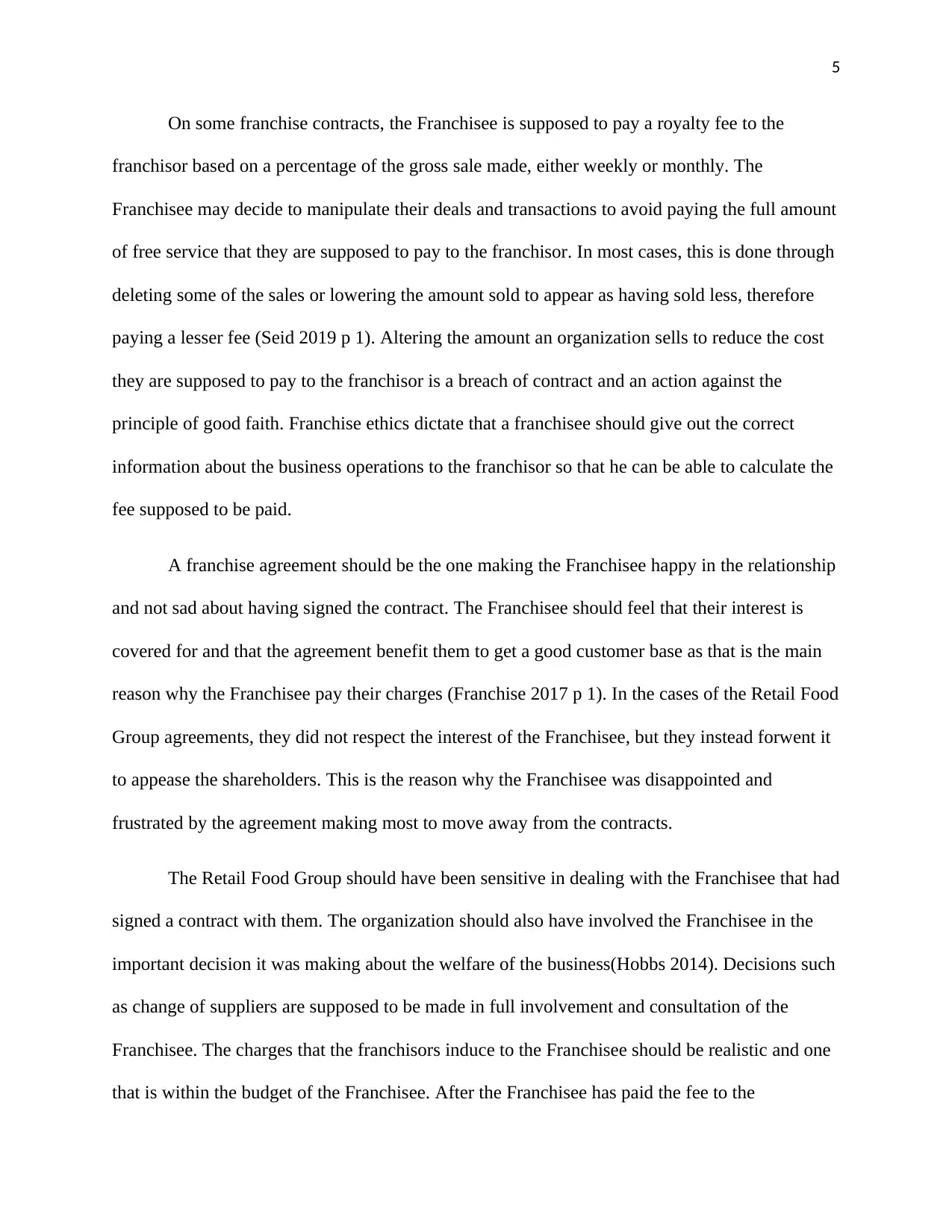
5
On some franchise contracts, the Franchisee is supposed to pay a royalty fee to the
franchisor based on a percentage of the gross sale made, either weekly or monthly. The
Franchisee may decide to manipulate their deals and transactions to avoid paying the full amount
of free service that they are supposed to pay to the franchisor. In most cases, this is done through
deleting some of the sales or lowering the amount sold to appear as having sold less, therefore
paying a lesser fee (Seid 2019 p 1). Altering the amount an organization sells to reduce the cost
they are supposed to pay to the franchisor is a breach of contract and an action against the
principle of good faith. Franchise ethics dictate that a franchisee should give out the correct
information about the business operations to the franchisor so that he can be able to calculate the
fee supposed to be paid.
A franchise agreement should be the one making the Franchisee happy in the relationship
and not sad about having signed the contract. The Franchisee should feel that their interest is
covered for and that the agreement benefit them to get a good customer base as that is the main
reason why the Franchisee pay their charges (Franchise 2017 p 1). In the cases of the Retail Food
Group agreements, they did not respect the interest of the Franchisee, but they instead forwent it
to appease the shareholders. This is the reason why the Franchisee was disappointed and
frustrated by the agreement making most to move away from the contracts.
The Retail Food Group should have been sensitive in dealing with the Franchisee that had
signed a contract with them. The organization should also have involved the Franchisee in the
important decision it was making about the welfare of the business(Hobbs 2014). Decisions such
as change of suppliers are supposed to be made in full involvement and consultation of the
Franchisee. The charges that the franchisors induce to the Franchisee should be realistic and one
that is within the budget of the Franchisee. After the Franchisee has paid the fee to the
On some franchise contracts, the Franchisee is supposed to pay a royalty fee to the
franchisor based on a percentage of the gross sale made, either weekly or monthly. The
Franchisee may decide to manipulate their deals and transactions to avoid paying the full amount
of free service that they are supposed to pay to the franchisor. In most cases, this is done through
deleting some of the sales or lowering the amount sold to appear as having sold less, therefore
paying a lesser fee (Seid 2019 p 1). Altering the amount an organization sells to reduce the cost
they are supposed to pay to the franchisor is a breach of contract and an action against the
principle of good faith. Franchise ethics dictate that a franchisee should give out the correct
information about the business operations to the franchisor so that he can be able to calculate the
fee supposed to be paid.
A franchise agreement should be the one making the Franchisee happy in the relationship
and not sad about having signed the contract. The Franchisee should feel that their interest is
covered for and that the agreement benefit them to get a good customer base as that is the main
reason why the Franchisee pay their charges (Franchise 2017 p 1). In the cases of the Retail Food
Group agreements, they did not respect the interest of the Franchisee, but they instead forwent it
to appease the shareholders. This is the reason why the Franchisee was disappointed and
frustrated by the agreement making most to move away from the contracts.
The Retail Food Group should have been sensitive in dealing with the Franchisee that had
signed a contract with them. The organization should also have involved the Franchisee in the
important decision it was making about the welfare of the business(Hobbs 2014). Decisions such
as change of suppliers are supposed to be made in full involvement and consultation of the
Franchisee. The charges that the franchisors induce to the Franchisee should be realistic and one
that is within the budget of the Franchisee. After the Franchisee has paid the fee to the
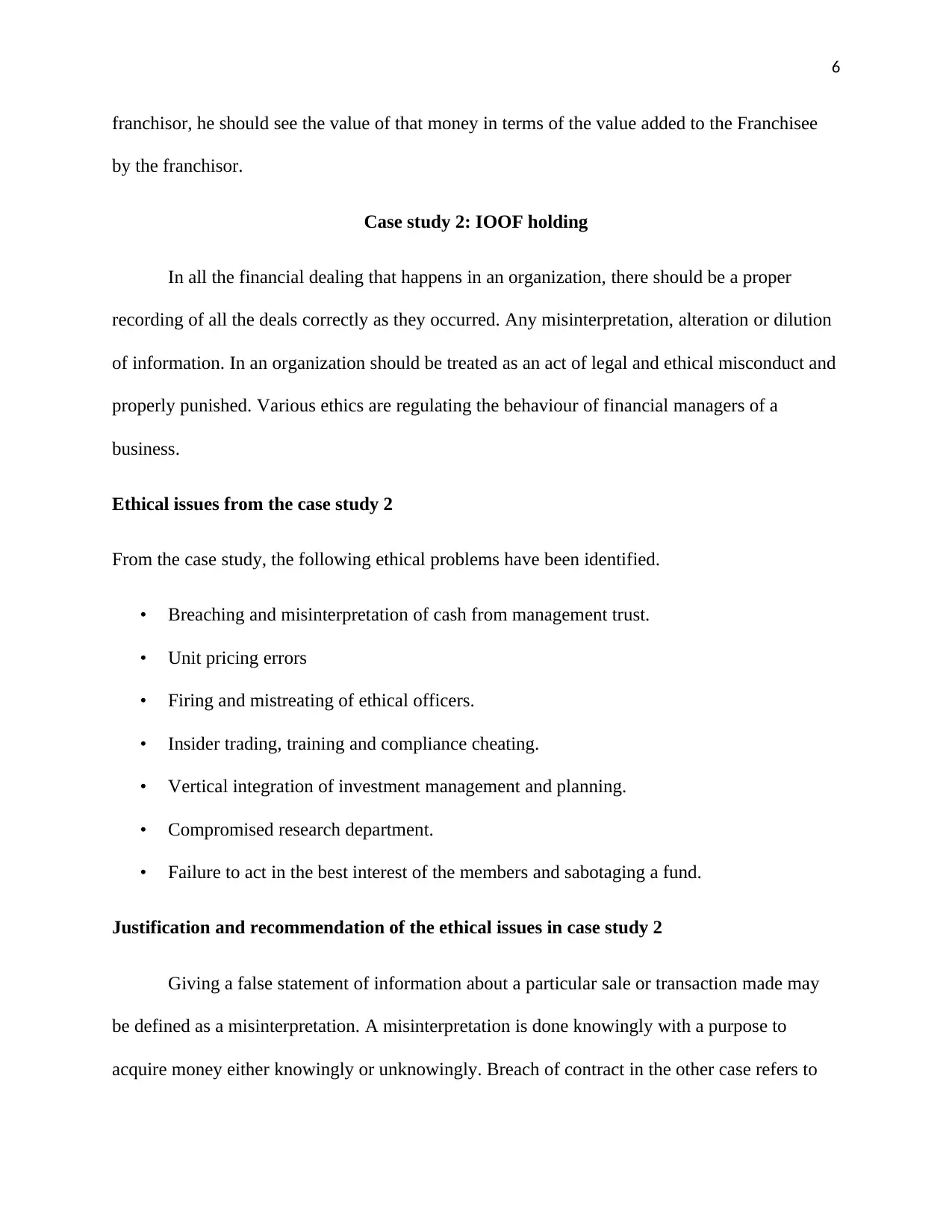
6
franchisor, he should see the value of that money in terms of the value added to the Franchisee
by the franchisor.
Case study 2: IOOF holding
In all the financial dealing that happens in an organization, there should be a proper
recording of all the deals correctly as they occurred. Any misinterpretation, alteration or dilution
of information. In an organization should be treated as an act of legal and ethical misconduct and
properly punished. Various ethics are regulating the behaviour of financial managers of a
business.
Ethical issues from the case study 2
From the case study, the following ethical problems have been identified.
• Breaching and misinterpretation of cash from management trust.
• Unit pricing errors
• Firing and mistreating of ethical officers.
• Insider trading, training and compliance cheating.
• Vertical integration of investment management and planning.
• Compromised research department.
• Failure to act in the best interest of the members and sabotaging a fund.
Justification and recommendation of the ethical issues in case study 2
Giving a false statement of information about a particular sale or transaction made may
be defined as a misinterpretation. A misinterpretation is done knowingly with a purpose to
acquire money either knowingly or unknowingly. Breach of contract in the other case refers to
franchisor, he should see the value of that money in terms of the value added to the Franchisee
by the franchisor.
Case study 2: IOOF holding
In all the financial dealing that happens in an organization, there should be a proper
recording of all the deals correctly as they occurred. Any misinterpretation, alteration or dilution
of information. In an organization should be treated as an act of legal and ethical misconduct and
properly punished. Various ethics are regulating the behaviour of financial managers of a
business.
Ethical issues from the case study 2
From the case study, the following ethical problems have been identified.
• Breaching and misinterpretation of cash from management trust.
• Unit pricing errors
• Firing and mistreating of ethical officers.
• Insider trading, training and compliance cheating.
• Vertical integration of investment management and planning.
• Compromised research department.
• Failure to act in the best interest of the members and sabotaging a fund.
Justification and recommendation of the ethical issues in case study 2
Giving a false statement of information about a particular sale or transaction made may
be defined as a misinterpretation. A misinterpretation is done knowingly with a purpose to
acquire money either knowingly or unknowingly. Breach of contract in the other case refers to
⊘ This is a preview!⊘
Do you want full access?
Subscribe today to unlock all pages.

Trusted by 1+ million students worldwide
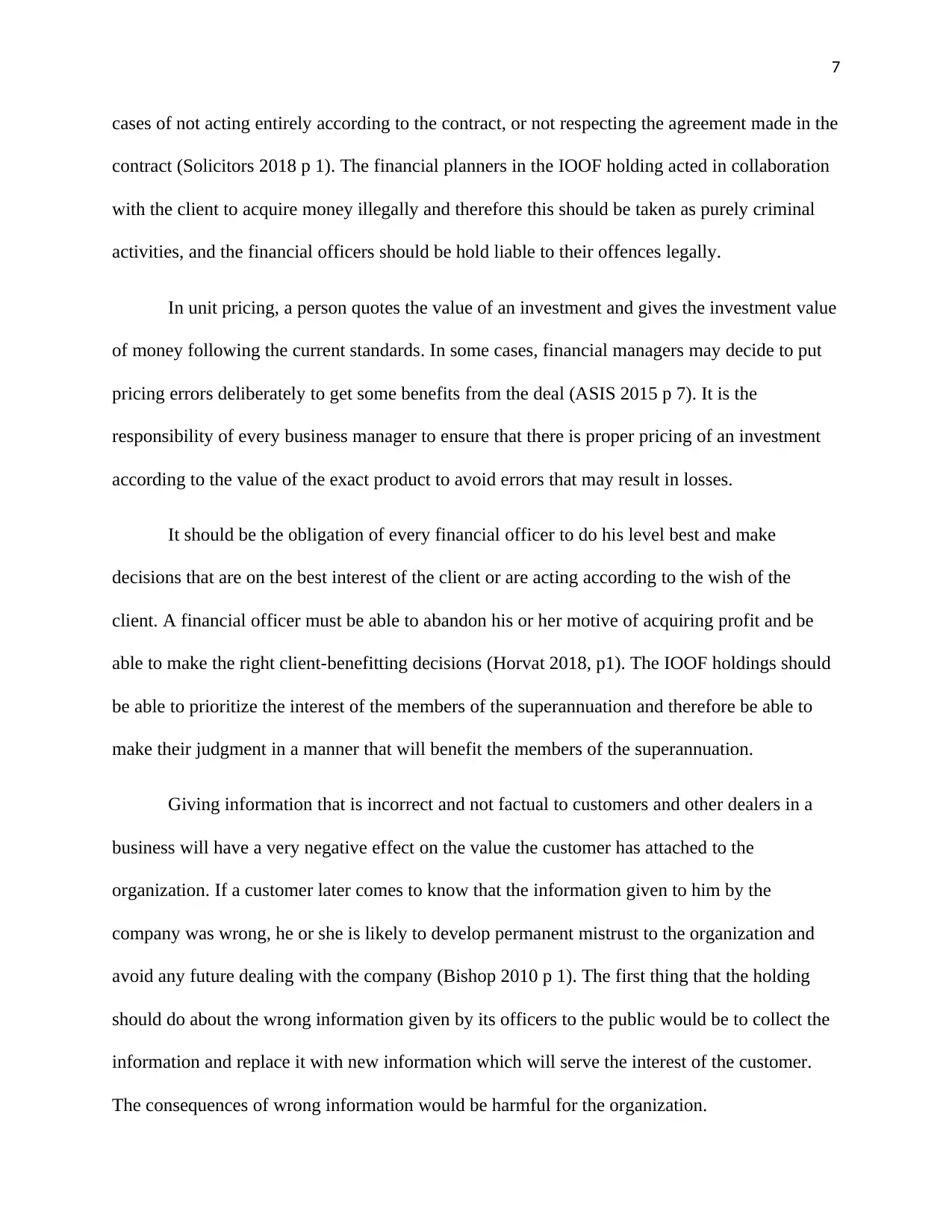
7
cases of not acting entirely according to the contract, or not respecting the agreement made in the
contract (Solicitors 2018 p 1). The financial planners in the IOOF holding acted in collaboration
with the client to acquire money illegally and therefore this should be taken as purely criminal
activities, and the financial officers should be hold liable to their offences legally.
In unit pricing, a person quotes the value of an investment and gives the investment value
of money following the current standards. In some cases, financial managers may decide to put
pricing errors deliberately to get some benefits from the deal (ASIS 2015 p 7). It is the
responsibility of every business manager to ensure that there is proper pricing of an investment
according to the value of the exact product to avoid errors that may result in losses.
It should be the obligation of every financial officer to do his level best and make
decisions that are on the best interest of the client or are acting according to the wish of the
client. A financial officer must be able to abandon his or her motive of acquiring profit and be
able to make the right client-benefitting decisions (Horvat 2018, p1). The IOOF holdings should
be able to prioritize the interest of the members of the superannuation and therefore be able to
make their judgment in a manner that will benefit the members of the superannuation.
Giving information that is incorrect and not factual to customers and other dealers in a
business will have a very negative effect on the value the customer has attached to the
organization. If a customer later comes to know that the information given to him by the
company was wrong, he or she is likely to develop permanent mistrust to the organization and
avoid any future dealing with the company (Bishop 2010 p 1). The first thing that the holding
should do about the wrong information given by its officers to the public would be to collect the
information and replace it with new information which will serve the interest of the customer.
The consequences of wrong information would be harmful for the organization.
cases of not acting entirely according to the contract, or not respecting the agreement made in the
contract (Solicitors 2018 p 1). The financial planners in the IOOF holding acted in collaboration
with the client to acquire money illegally and therefore this should be taken as purely criminal
activities, and the financial officers should be hold liable to their offences legally.
In unit pricing, a person quotes the value of an investment and gives the investment value
of money following the current standards. In some cases, financial managers may decide to put
pricing errors deliberately to get some benefits from the deal (ASIS 2015 p 7). It is the
responsibility of every business manager to ensure that there is proper pricing of an investment
according to the value of the exact product to avoid errors that may result in losses.
It should be the obligation of every financial officer to do his level best and make
decisions that are on the best interest of the client or are acting according to the wish of the
client. A financial officer must be able to abandon his or her motive of acquiring profit and be
able to make the right client-benefitting decisions (Horvat 2018, p1). The IOOF holdings should
be able to prioritize the interest of the members of the superannuation and therefore be able to
make their judgment in a manner that will benefit the members of the superannuation.
Giving information that is incorrect and not factual to customers and other dealers in a
business will have a very negative effect on the value the customer has attached to the
organization. If a customer later comes to know that the information given to him by the
company was wrong, he or she is likely to develop permanent mistrust to the organization and
avoid any future dealing with the company (Bishop 2010 p 1). The first thing that the holding
should do about the wrong information given by its officers to the public would be to collect the
information and replace it with new information which will serve the interest of the customer.
The consequences of wrong information would be harmful for the organization.
Paraphrase This Document
Need a fresh take? Get an instant paraphrase of this document with our AI Paraphraser
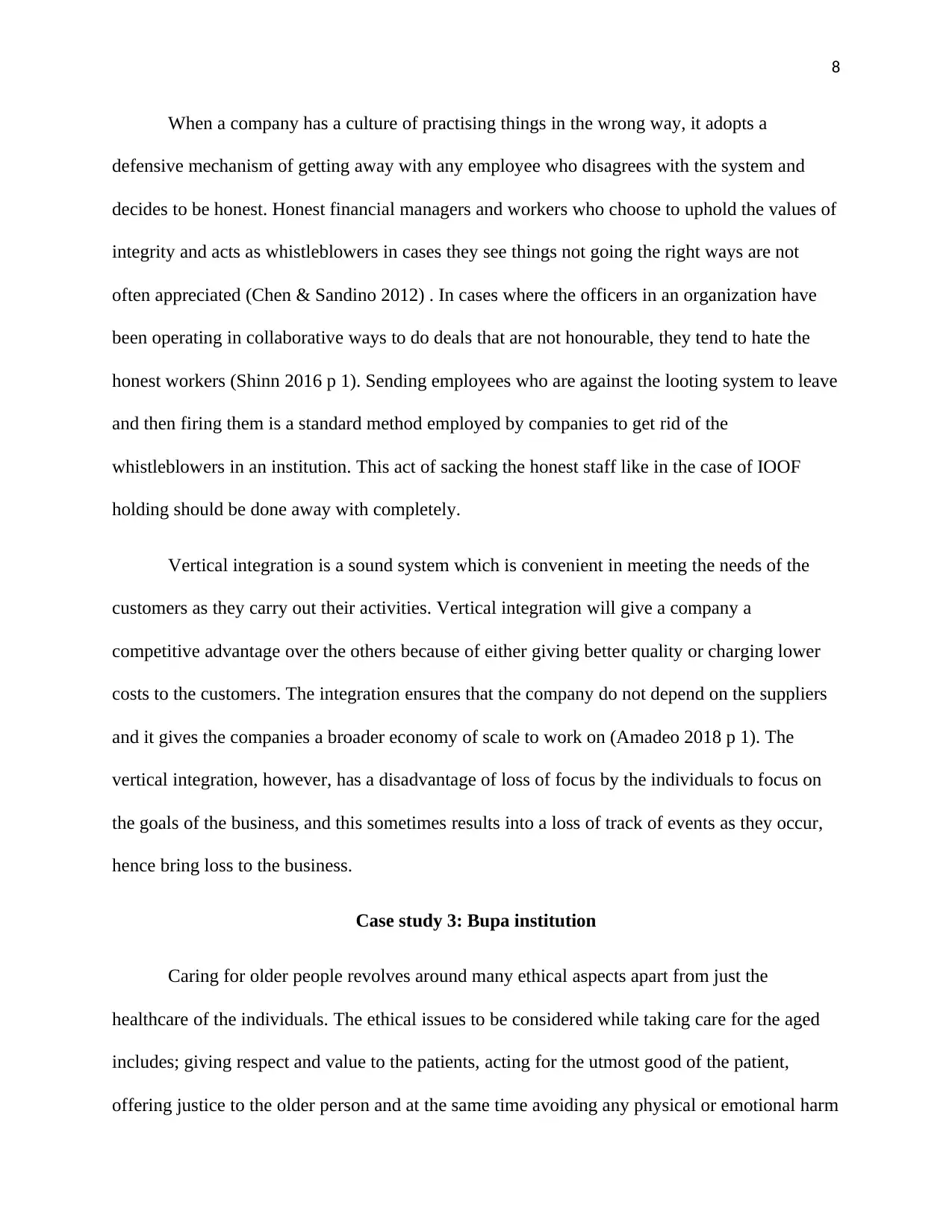
8
When a company has a culture of practising things in the wrong way, it adopts a
defensive mechanism of getting away with any employee who disagrees with the system and
decides to be honest. Honest financial managers and workers who choose to uphold the values of
integrity and acts as whistleblowers in cases they see things not going the right ways are not
often appreciated (Chen & Sandino 2012) . In cases where the officers in an organization have
been operating in collaborative ways to do deals that are not honourable, they tend to hate the
honest workers (Shinn 2016 p 1). Sending employees who are against the looting system to leave
and then firing them is a standard method employed by companies to get rid of the
whistleblowers in an institution. This act of sacking the honest staff like in the case of IOOF
holding should be done away with completely.
Vertical integration is a sound system which is convenient in meeting the needs of the
customers as they carry out their activities. Vertical integration will give a company a
competitive advantage over the others because of either giving better quality or charging lower
costs to the customers. The integration ensures that the company do not depend on the suppliers
and it gives the companies a broader economy of scale to work on (Amadeo 2018 p 1). The
vertical integration, however, has a disadvantage of loss of focus by the individuals to focus on
the goals of the business, and this sometimes results into a loss of track of events as they occur,
hence bring loss to the business.
Case study 3: Bupa institution
Caring for older people revolves around many ethical aspects apart from just the
healthcare of the individuals. The ethical issues to be considered while taking care for the aged
includes; giving respect and value to the patients, acting for the utmost good of the patient,
offering justice to the older person and at the same time avoiding any physical or emotional harm
When a company has a culture of practising things in the wrong way, it adopts a
defensive mechanism of getting away with any employee who disagrees with the system and
decides to be honest. Honest financial managers and workers who choose to uphold the values of
integrity and acts as whistleblowers in cases they see things not going the right ways are not
often appreciated (Chen & Sandino 2012) . In cases where the officers in an organization have
been operating in collaborative ways to do deals that are not honourable, they tend to hate the
honest workers (Shinn 2016 p 1). Sending employees who are against the looting system to leave
and then firing them is a standard method employed by companies to get rid of the
whistleblowers in an institution. This act of sacking the honest staff like in the case of IOOF
holding should be done away with completely.
Vertical integration is a sound system which is convenient in meeting the needs of the
customers as they carry out their activities. Vertical integration will give a company a
competitive advantage over the others because of either giving better quality or charging lower
costs to the customers. The integration ensures that the company do not depend on the suppliers
and it gives the companies a broader economy of scale to work on (Amadeo 2018 p 1). The
vertical integration, however, has a disadvantage of loss of focus by the individuals to focus on
the goals of the business, and this sometimes results into a loss of track of events as they occur,
hence bring loss to the business.
Case study 3: Bupa institution
Caring for older people revolves around many ethical aspects apart from just the
healthcare of the individuals. The ethical issues to be considered while taking care for the aged
includes; giving respect and value to the patients, acting for the utmost good of the patient,
offering justice to the older person and at the same time avoiding any physical or emotional harm
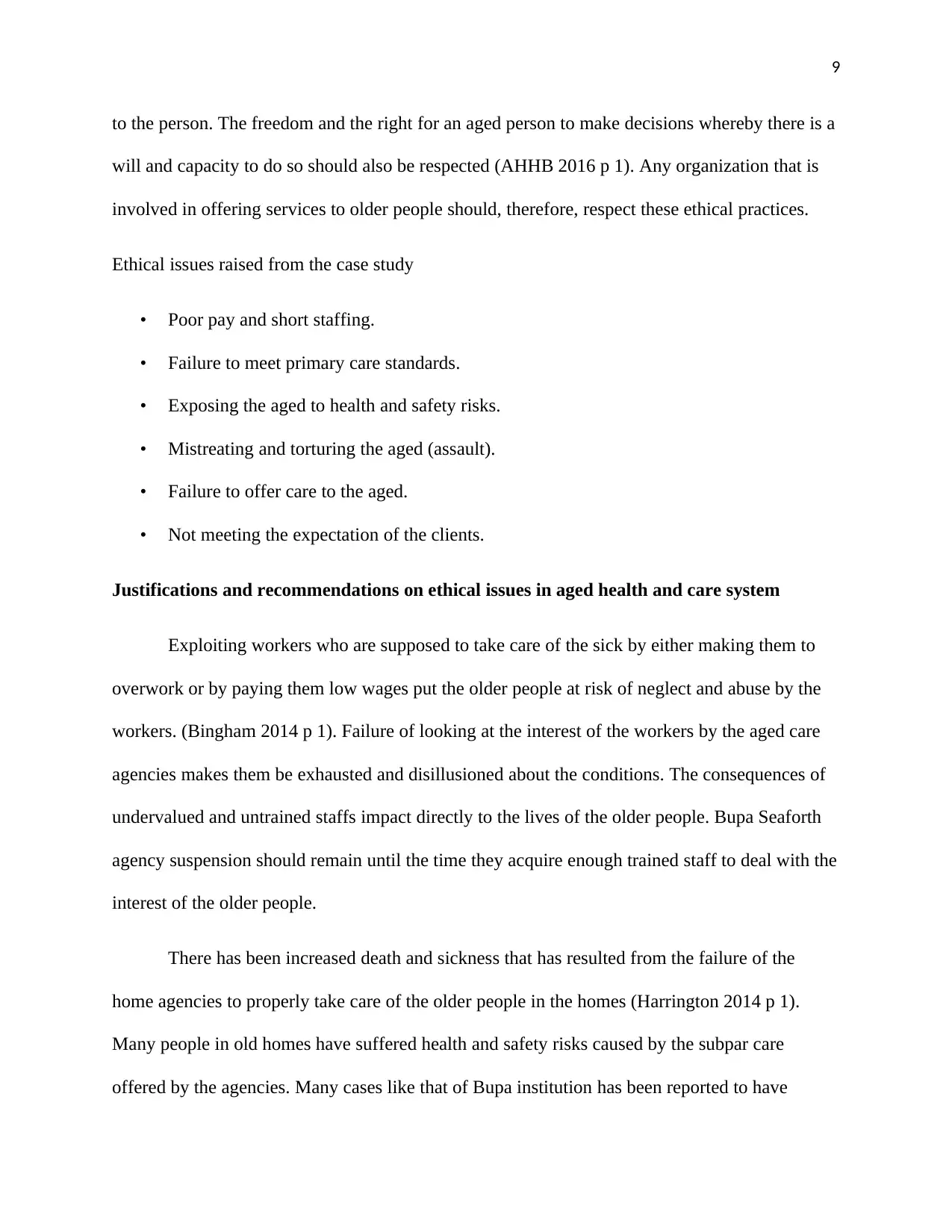
9
to the person. The freedom and the right for an aged person to make decisions whereby there is a
will and capacity to do so should also be respected (AHHB 2016 p 1). Any organization that is
involved in offering services to older people should, therefore, respect these ethical practices.
Ethical issues raised from the case study
• Poor pay and short staffing.
• Failure to meet primary care standards.
• Exposing the aged to health and safety risks.
• Mistreating and torturing the aged (assault).
• Failure to offer care to the aged.
• Not meeting the expectation of the clients.
Justifications and recommendations on ethical issues in aged health and care system
Exploiting workers who are supposed to take care of the sick by either making them to
overwork or by paying them low wages put the older people at risk of neglect and abuse by the
workers. (Bingham 2014 p 1). Failure of looking at the interest of the workers by the aged care
agencies makes them be exhausted and disillusioned about the conditions. The consequences of
undervalued and untrained staffs impact directly to the lives of the older people. Bupa Seaforth
agency suspension should remain until the time they acquire enough trained staff to deal with the
interest of the older people.
There has been increased death and sickness that has resulted from the failure of the
home agencies to properly take care of the older people in the homes (Harrington 2014 p 1).
Many people in old homes have suffered health and safety risks caused by the subpar care
offered by the agencies. Many cases like that of Bupa institution has been reported to have
to the person. The freedom and the right for an aged person to make decisions whereby there is a
will and capacity to do so should also be respected (AHHB 2016 p 1). Any organization that is
involved in offering services to older people should, therefore, respect these ethical practices.
Ethical issues raised from the case study
• Poor pay and short staffing.
• Failure to meet primary care standards.
• Exposing the aged to health and safety risks.
• Mistreating and torturing the aged (assault).
• Failure to offer care to the aged.
• Not meeting the expectation of the clients.
Justifications and recommendations on ethical issues in aged health and care system
Exploiting workers who are supposed to take care of the sick by either making them to
overwork or by paying them low wages put the older people at risk of neglect and abuse by the
workers. (Bingham 2014 p 1). Failure of looking at the interest of the workers by the aged care
agencies makes them be exhausted and disillusioned about the conditions. The consequences of
undervalued and untrained staffs impact directly to the lives of the older people. Bupa Seaforth
agency suspension should remain until the time they acquire enough trained staff to deal with the
interest of the older people.
There has been increased death and sickness that has resulted from the failure of the
home agencies to properly take care of the older people in the homes (Harrington 2014 p 1).
Many people in old homes have suffered health and safety risks caused by the subpar care
offered by the agencies. Many cases like that of Bupa institution has been reported to have
⊘ This is a preview!⊘
Do you want full access?
Subscribe today to unlock all pages.

Trusted by 1+ million students worldwide
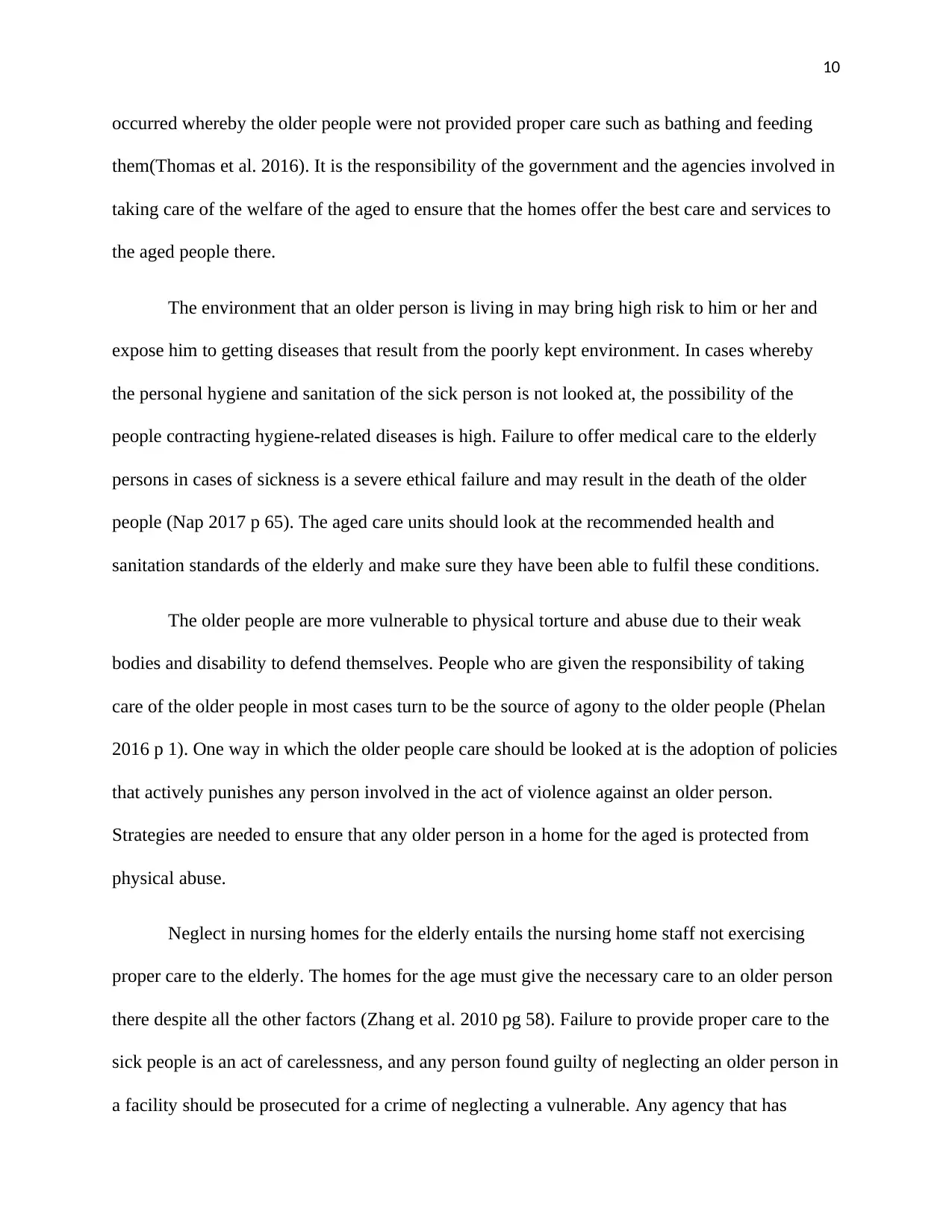
10
occurred whereby the older people were not provided proper care such as bathing and feeding
them(Thomas et al. 2016). It is the responsibility of the government and the agencies involved in
taking care of the welfare of the aged to ensure that the homes offer the best care and services to
the aged people there.
The environment that an older person is living in may bring high risk to him or her and
expose him to getting diseases that result from the poorly kept environment. In cases whereby
the personal hygiene and sanitation of the sick person is not looked at, the possibility of the
people contracting hygiene-related diseases is high. Failure to offer medical care to the elderly
persons in cases of sickness is a severe ethical failure and may result in the death of the older
people (Nap 2017 p 65). The aged care units should look at the recommended health and
sanitation standards of the elderly and make sure they have been able to fulfil these conditions.
The older people are more vulnerable to physical torture and abuse due to their weak
bodies and disability to defend themselves. People who are given the responsibility of taking
care of the older people in most cases turn to be the source of agony to the older people (Phelan
2016 p 1). One way in which the older people care should be looked at is the adoption of policies
that actively punishes any person involved in the act of violence against an older person.
Strategies are needed to ensure that any older person in a home for the aged is protected from
physical abuse.
Neglect in nursing homes for the elderly entails the nursing home staff not exercising
proper care to the elderly. The homes for the age must give the necessary care to an older person
there despite all the other factors (Zhang et al. 2010 pg 58). Failure to provide proper care to the
sick people is an act of carelessness, and any person found guilty of neglecting an older person in
a facility should be prosecuted for a crime of neglecting a vulnerable. Any agency that has
occurred whereby the older people were not provided proper care such as bathing and feeding
them(Thomas et al. 2016). It is the responsibility of the government and the agencies involved in
taking care of the welfare of the aged to ensure that the homes offer the best care and services to
the aged people there.
The environment that an older person is living in may bring high risk to him or her and
expose him to getting diseases that result from the poorly kept environment. In cases whereby
the personal hygiene and sanitation of the sick person is not looked at, the possibility of the
people contracting hygiene-related diseases is high. Failure to offer medical care to the elderly
persons in cases of sickness is a severe ethical failure and may result in the death of the older
people (Nap 2017 p 65). The aged care units should look at the recommended health and
sanitation standards of the elderly and make sure they have been able to fulfil these conditions.
The older people are more vulnerable to physical torture and abuse due to their weak
bodies and disability to defend themselves. People who are given the responsibility of taking
care of the older people in most cases turn to be the source of agony to the older people (Phelan
2016 p 1). One way in which the older people care should be looked at is the adoption of policies
that actively punishes any person involved in the act of violence against an older person.
Strategies are needed to ensure that any older person in a home for the aged is protected from
physical abuse.
Neglect in nursing homes for the elderly entails the nursing home staff not exercising
proper care to the elderly. The homes for the age must give the necessary care to an older person
there despite all the other factors (Zhang et al. 2010 pg 58). Failure to provide proper care to the
sick people is an act of carelessness, and any person found guilty of neglecting an older person in
a facility should be prosecuted for a crime of neglecting a vulnerable. Any agency that has
Paraphrase This Document
Need a fresh take? Get an instant paraphrase of this document with our AI Paraphraser
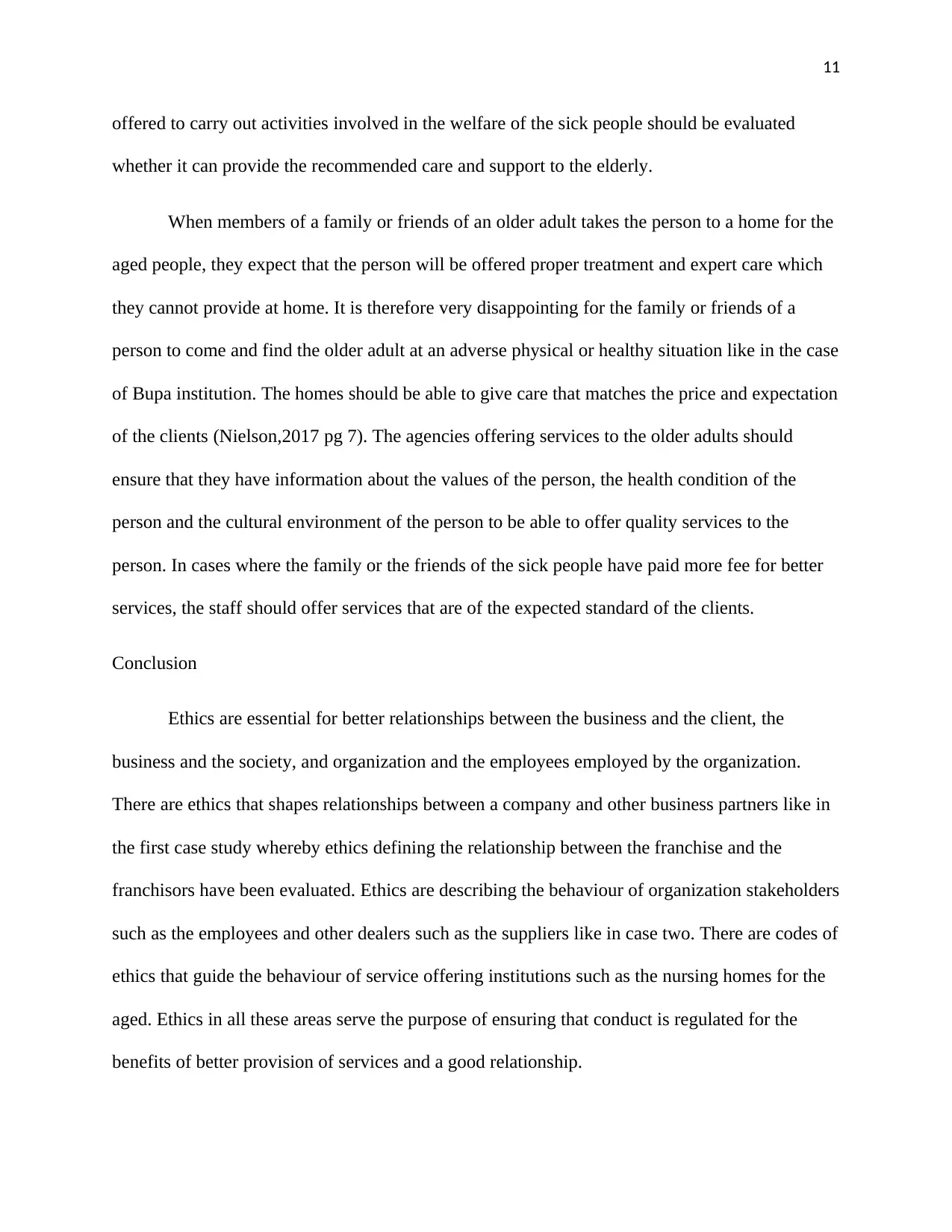
11
offered to carry out activities involved in the welfare of the sick people should be evaluated
whether it can provide the recommended care and support to the elderly.
When members of a family or friends of an older adult takes the person to a home for the
aged people, they expect that the person will be offered proper treatment and expert care which
they cannot provide at home. It is therefore very disappointing for the family or friends of a
person to come and find the older adult at an adverse physical or healthy situation like in the case
of Bupa institution. The homes should be able to give care that matches the price and expectation
of the clients (Nielson,2017 pg 7). The agencies offering services to the older adults should
ensure that they have information about the values of the person, the health condition of the
person and the cultural environment of the person to be able to offer quality services to the
person. In cases where the family or the friends of the sick people have paid more fee for better
services, the staff should offer services that are of the expected standard of the clients.
Conclusion
Ethics are essential for better relationships between the business and the client, the
business and the society, and organization and the employees employed by the organization.
There are ethics that shapes relationships between a company and other business partners like in
the first case study whereby ethics defining the relationship between the franchise and the
franchisors have been evaluated. Ethics are describing the behaviour of organization stakeholders
such as the employees and other dealers such as the suppliers like in case two. There are codes of
ethics that guide the behaviour of service offering institutions such as the nursing homes for the
aged. Ethics in all these areas serve the purpose of ensuring that conduct is regulated for the
benefits of better provision of services and a good relationship.
offered to carry out activities involved in the welfare of the sick people should be evaluated
whether it can provide the recommended care and support to the elderly.
When members of a family or friends of an older adult takes the person to a home for the
aged people, they expect that the person will be offered proper treatment and expert care which
they cannot provide at home. It is therefore very disappointing for the family or friends of a
person to come and find the older adult at an adverse physical or healthy situation like in the case
of Bupa institution. The homes should be able to give care that matches the price and expectation
of the clients (Nielson,2017 pg 7). The agencies offering services to the older adults should
ensure that they have information about the values of the person, the health condition of the
person and the cultural environment of the person to be able to offer quality services to the
person. In cases where the family or the friends of the sick people have paid more fee for better
services, the staff should offer services that are of the expected standard of the clients.
Conclusion
Ethics are essential for better relationships between the business and the client, the
business and the society, and organization and the employees employed by the organization.
There are ethics that shapes relationships between a company and other business partners like in
the first case study whereby ethics defining the relationship between the franchise and the
franchisors have been evaluated. Ethics are describing the behaviour of organization stakeholders
such as the employees and other dealers such as the suppliers like in case two. There are codes of
ethics that guide the behaviour of service offering institutions such as the nursing homes for the
aged. Ethics in all these areas serve the purpose of ensuring that conduct is regulated for the
benefits of better provision of services and a good relationship.
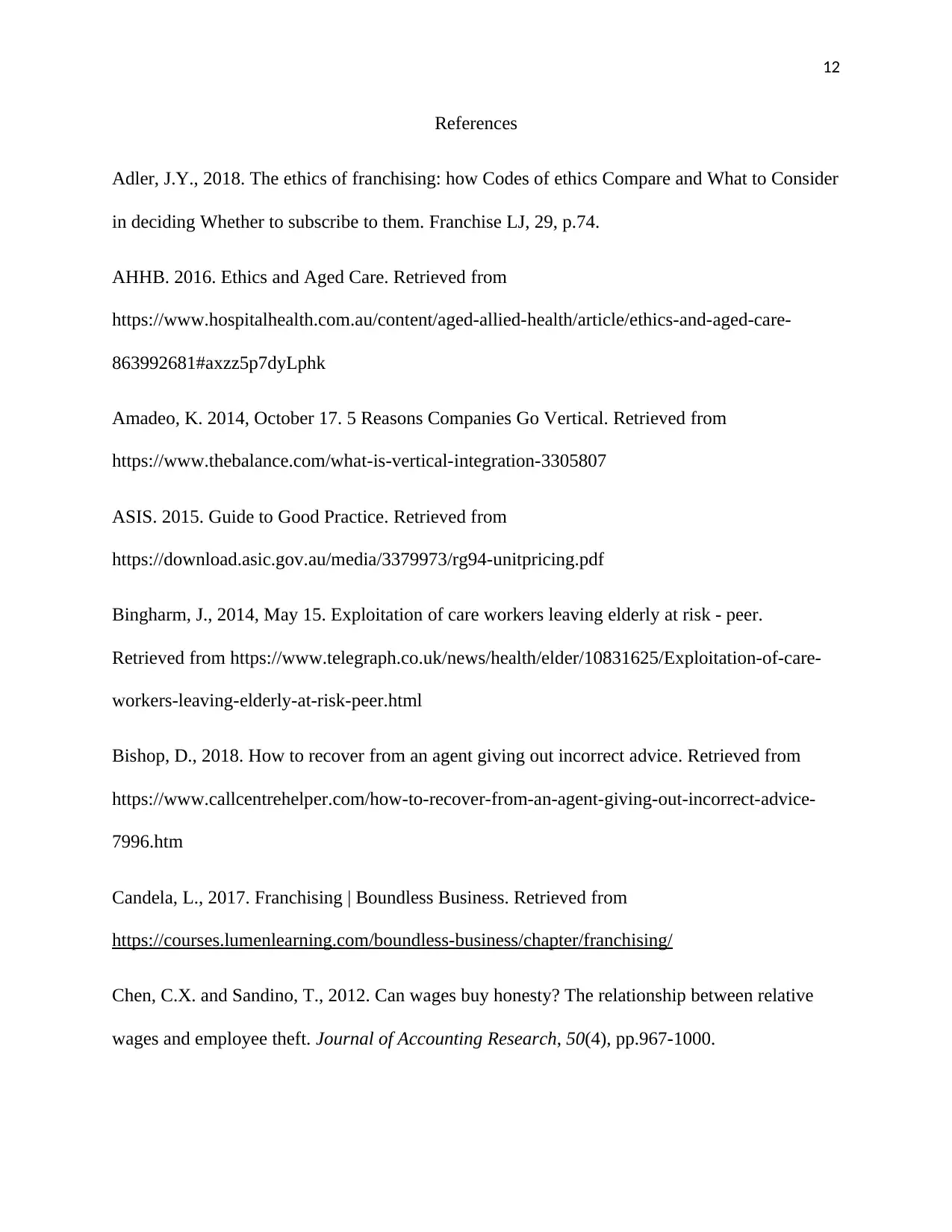
12
References
Adler, J.Y., 2018. The ethics of franchising: how Codes of ethics Compare and What to Consider
in deciding Whether to subscribe to them. Franchise LJ, 29, p.74.
AHHB. 2016. Ethics and Aged Care. Retrieved from
https://www.hospitalhealth.com.au/content/aged-allied-health/article/ethics-and-aged-care-
863992681#axzz5p7dyLphk
Amadeo, K. 2014, October 17. 5 Reasons Companies Go Vertical. Retrieved from
https://www.thebalance.com/what-is-vertical-integration-3305807
ASIS. 2015. Guide to Good Practice. Retrieved from
https://download.asic.gov.au/media/3379973/rg94-unitpricing.pdf
Bingharm, J., 2014, May 15. Exploitation of care workers leaving elderly at risk - peer.
Retrieved from https://www.telegraph.co.uk/news/health/elder/10831625/Exploitation-of-care-
workers-leaving-elderly-at-risk-peer.html
Bishop, D., 2018. How to recover from an agent giving out incorrect advice. Retrieved from
https://www.callcentrehelper.com/how-to-recover-from-an-agent-giving-out-incorrect-advice-
7996.htm
Candela, L., 2017. Franchising | Boundless Business. Retrieved from
https://courses.lumenlearning.com/boundless-business/chapter/franchising/
Chen, C.X. and Sandino, T., 2012. Can wages buy honesty? The relationship between relative
wages and employee theft. Journal of Accounting Research, 50(4), pp.967-1000.
References
Adler, J.Y., 2018. The ethics of franchising: how Codes of ethics Compare and What to Consider
in deciding Whether to subscribe to them. Franchise LJ, 29, p.74.
AHHB. 2016. Ethics and Aged Care. Retrieved from
https://www.hospitalhealth.com.au/content/aged-allied-health/article/ethics-and-aged-care-
863992681#axzz5p7dyLphk
Amadeo, K. 2014, October 17. 5 Reasons Companies Go Vertical. Retrieved from
https://www.thebalance.com/what-is-vertical-integration-3305807
ASIS. 2015. Guide to Good Practice. Retrieved from
https://download.asic.gov.au/media/3379973/rg94-unitpricing.pdf
Bingharm, J., 2014, May 15. Exploitation of care workers leaving elderly at risk - peer.
Retrieved from https://www.telegraph.co.uk/news/health/elder/10831625/Exploitation-of-care-
workers-leaving-elderly-at-risk-peer.html
Bishop, D., 2018. How to recover from an agent giving out incorrect advice. Retrieved from
https://www.callcentrehelper.com/how-to-recover-from-an-agent-giving-out-incorrect-advice-
7996.htm
Candela, L., 2017. Franchising | Boundless Business. Retrieved from
https://courses.lumenlearning.com/boundless-business/chapter/franchising/
Chen, C.X. and Sandino, T., 2012. Can wages buy honesty? The relationship between relative
wages and employee theft. Journal of Accounting Research, 50(4), pp.967-1000.
⊘ This is a preview!⊘
Do you want full access?
Subscribe today to unlock all pages.

Trusted by 1+ million students worldwide
1 out of 14
Related Documents
Your All-in-One AI-Powered Toolkit for Academic Success.
+13062052269
info@desklib.com
Available 24*7 on WhatsApp / Email
![[object Object]](/_next/static/media/star-bottom.7253800d.svg)
Unlock your academic potential
Copyright © 2020–2026 A2Z Services. All Rights Reserved. Developed and managed by ZUCOL.




